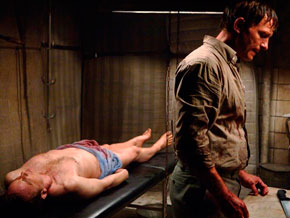The Cannibal is a film based on true events. It's not a documentary. The production claims to be a horror film, but it fails to fit this standard. Let me tell you right now: the film is very bad. The narrative presents us with the true story of a German cannibal who terrorized the world.
Narrated by the protagonist Katie (Keri Russel), we are informed right from the start, at a dinner with friends, that she is traveling for field research on her thesis in the area of Criminal Psychology, based on the case of the cannibal Oliver. During that dinner, one of her friends tells her that we taste like pork, little does Katie know, that later on, she would delve deeply into this terrifying story. The initial narration is alternated by other narrators, in a story that is intended to be polyphonic.
Following the classic pattern of cinematic narratives, we have a long shot, setting the plot, preceded by an off-screen notice that claims to be a film "based on true events", telling the audience the story of Oliver (Thomas Kretschmann) and Simon ( Thomas Huber). Oliver has a dark past. As a child he used to play with a doctor friend and was bullied at school. Living on his mother's heels, he suffers after her death, like a kind of Norman Battes, from Psycho, except, obviously, for the appropriate proportions. He is advised by a friend who tries to be close, but who is rejected whenever she seeks closeness, to have the chance of a lifetime, to stop being a child and become a man.
Simon lived with his father until he was thirty. As a child he witnessed his mother committing suicide. Insecure, he does not accept his condition and is always pushing away the public affections of his boyfriend Felix (Marcus Lucas). He lives wandering around looking for someone who will satisfy his desire. In an average scene, he goes out with a prostitute and during the sex scene, he asks him to bite his penis hard, pulling it off, in order to achieve sexual ecstasy. Scared, the boy doesn't accept it and leaves the hotel room. Frustrated, Simon goes home and, more than ever, decides to go and meet someone who fulfills his wish: for his flesh to be eaten, because in his mind, it would reach a glorious level in its history of existence.
Once the meeting between the boys is scheduled, the rules are established: the victim must be unconscious, have drunk a lot of water and not have eaten in the last 98 hours. On site, a bathtub to drain the blood, a cage for few movements of the future "house dish" and a wide table to serve as a counter. Oliver, an intense researcher, already has all this in his booklet. Their plan is to have Simon's lightly grilled penis for dinner. Before Simon, a young man ventured out, but lost his courage in the face of the macabre dictates of the process. Oliver, so obsessed with cannibalism, confesses to masturbating thinking about a room full of chopped up bodies.
The narrative lacks rhythm. Among the childhood scenes, the milestone is seeing a pig being disemboweled. The scene takes us back to the modern classic "The Silence of the Lambs", in a passing allusion, after all, comparing the powerful duel between Jodie Foster and Anthony Hopkins is almost heresy. For those who saw it, we know that the sound of lambs being disemboweled by her uncle when she was a child had left a deep impression on her. Many details from the boy's childhood are recalled, in a collage of sketches about events from the past that could have formed the character of the unbalanced character.
There are other scenes that seem to seek to prove a thesis, exploring events that allow us to be in dialogue with student Katie's thesis. As a child, one of the boys was given the documentary Faces of Death to watch. At another point, one of them eats the doll he had received as a gift from a third party.
Another scene that has little effect is when a character comments on the horrors of children's stories, citing Hansel and Gretel, a classic plot considered childish, but which in fact expressed dark connotations. With facts like these being mentioned superficially in the dialogues, little, very little is used.
A message for the unaware: the real story, read through the eyes of journalists, is more impactful than any scene in the film. The jargon "a picture is worth a thousand words" does not apply to the final result of "The Cannibal", such is the lack of ability of those involved to tell a story. It is worth mentioning that the film does not fail due to the lack of quality of technological resources, but due to the incompetence of the directors in giving dignity and verisimilitude to what is told, and the performances too, all uninspired.
This verisimilitude is required because it is not a journalistic report or documentary, but rather a fiction based on real facts. Firstly, the protagonist researcher is weak, not very interested, her research is carried out sloppily and the dialogues do not allow the public to identify with the work carried out by the girl, a serious problem for a script with a story that is not very palatable by traditional standards. Secondly, the lack of boldness in dealing with a topic so outside the canon is evident in all sectors of the production: Sue Blainey's editing, too common, added to Jonathan Sela's photography and the already mentioned weak script by TS Fauley.
The macabre journey, considered by one of the characters as a path of no return, brings some sharecropping dialogues: over the phone, Oliver informs Simon that "I want you in my teeth. They are very strong". In another actor's performance, perhaps this line would cause goosebumps, but in the film, just a yawn or perhaps a question of "what's next"?
The film doesn't even recycle narrative clichés of this kind, transforming a scary story into a meander of clichés and lazy dialogues. Let's face it, the plot based on a true German story is not convincing and lacks drama. The real-life cannibal himself, when checking it out, claimed that the film is uncreative, not taking advantage of the horror of the real story to build a disturbing and more convincing narrative.
At 90 minutes long, "The Cannibal" has a more terrifying argument than the mannerist nonsense of the Saw saga, but it gets lost in a narrative guided by lazy direction, where dialogues that should be conducted in an operatic manner seem more like loose lines and no cohesion. If the direction is terrible, imagine the performances. Characters as superficial as the script, packaged in an inexpressive art direction and a sound that does not immerse the viewer in the time and space suggested by the narrative: cold streets and identical human relationships.
Forgive the main actress, but her performance makes us wish we had her as the first character to be devoured by the unbalanced Oliver. Bad.
Rating: 03 – Available on DVD
*Leonardo Campos writes biweekly in this space about cinema and DVD releases. He is a researcher in cinema, literature and culture at the Federal University of Bahia (UFBA) and professor of literature.



